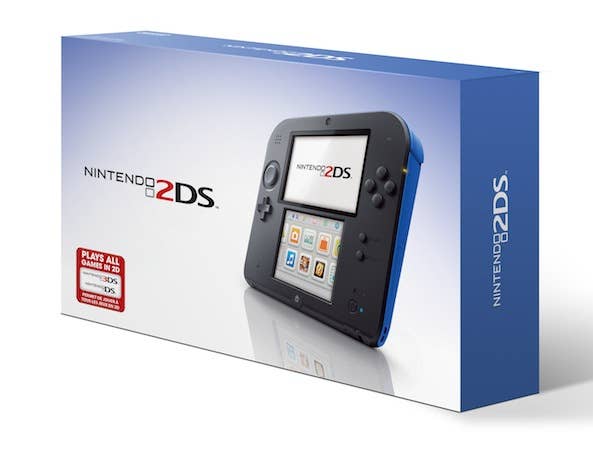Nintendo: "We don't want to walk away" from 3D gaming
Nintendo's Scott Moffitt insists that the new 2DS doesn't represent backpedaling, notes that it's all about reaching huge audience at $129
In light of the announcement of the Nintendo 2DS today, we sat down with the company's executive vice president of sales and marketing Scott Moffitt to talk all about the new entry in the portable space. In this exclusive interview, conducted by USgamer's Jeremy Parish on behalf of GamesIndustry International, we find out who the 2DS is really for and how it fits into the increasingly crowded mobile and handheld market. Interestingly, we also see that Nintendo remains confident in 3D gaming despite the fact that its 2DS dispenses with it altogether. At the end, Moffitt even takes a dig at Sony, saying Vita's sales show that Nintendo's approach is the one that's actually working.
Here's the full Q&A. Enjoy!
It's not tied to an account. Yeah. We haven't solved that yet.
If you look at the account system, the network ID system that exists now on Wii U, that's an effort for us to move beyond a device-centric approach to an account-centric approach. But we haven't done it on the handheld side of the business at this point. We hear that feedback. We hear that criticism, or whatever you want to call it, from time to time. We're not blind to it. But it's not something we've solved.
Yeah. I would just challenge… If you have a 3DS and you enjoy playing it there on a bigger screen… I wouldn't think we would expect you to be part of the buyer base.
"A lot of it is driven by wanting to achieve a price point that is more accessible for consumers...Removing the 3D capability allowed us to get to a better price point"
It feels more familiar to you?
Yeah. I guess all I can say is that you weren't directly in our crosshairs as we were assessing the market potential for this initiative. You never can guess who's going to respond to a new piece of hardware.
But I think our expectation was that we were primarily trying to address the value barrier that might exist for some consumers to playing a 3DS. They could be DS owners that haven't yet upgraded to the 3DS because of price and because they love playing their old DS games. It could be young kids just entering the video game market, and parents not wanting to buy them a $200 gaming system. Now we're much closer to $100, which makes it much more affordable for them. I think that was probably the audience we expected or intended to design the unit for. But I think it's good feedback.
The original DS? Yes, the original DS, that's $99. The DS still exists, so it's really four [items in the lineup]. Certainly our emphasis and our priority is on the 3DS platform. That's where we've made our commitment. That's our future. So we are not developing gaming content for DS at this point. Our resources are focused on 3DS. But that'll still be in the lineup, yes.

It's lighter weight, though.
A lot of it is driven by wanting to achieve a price point that is more accessible for consumers. The 3DS screen is a fairly expensive piece of equipment that's built into the system. Removing the 3D capability allowed us to get to a better price point. The hinged clamshell design is also an issue.
There's a carrying case that's sold that allows you to pop that into a backpack or throw it in a suitcase if you're on the road or getting in the car or if you just want to carry it with you. That, we think, is probably the predominant way that consumers might carry it around. I don't think kids would carry it around in their pocket that often now anyway. I think that's what went into the design. How can we achieve the price point in the most economical manner?
No, I think portability is still a factor. My point is just that I don't think kids fold it and put it in their pocket very often. This shouldn't be any less portable than a base 3DS or a DS today. But portability is clearly important.
It's molded open, so it's not a clamshell design like we've had in previous years. Certainly that form factor is reminiscent of some of the products we've had in our lineup in the early days. It's a form factor that we've sold and launched and had great success with before. I don't think there's anything more that inspired it other than that we've done these kinds of systems before. We know how to create them, we know how to design them, we know how to make them work.
Not at all. Clearly our development efforts all include 3D games. Our installed base, we have eight million units installed. If 3D wasn't selling and wasn't part of our future, we wouldn't be seeing and enjoying the robust sales we have on 3DS right now. I think you know that the 3DS is the number one gaming platform on the market. We're having a very good year with 3DS. Our games continue to sell extremely well. Our forecast for pretty much everything we've launched this year has surprised us on the positive side. We've been very happy with the 3DS part of our business. This is really all about addressing that next opportunity in the US market.
"There's a lot of great 3D experiences that gamers have come to love. We don't want to walk away from that at all"
Not at all. I'd say that our fan feedback, gamer feedback, has been that they very much enjoy 3D as a feature. Games like Super Mario 3D Land play fabulously well in 3D. There's a lot of great 3D experiences that gamers have come to love. We don't want to walk away from that at all.
They also will play well in 2D, and it allows us to get to a price point that we couldn't get to with the 3D screen. If we can get to that in another way... If you're asking me if we could get to a price point of $129 with 3D functionality, it didn't look like it was possible. That's the reason. It's less about wanting to have 3D in and it's more about trying to get to the value price point that's going to allow us to open up that next part of the market.
People may see it that way. I just think it's a misread of the situation. I don't think that's an accurate characterization of our commitment to 3D and our belief that it adds something new and exciting to the world of gaming.
I understand your point. I guess I appreciate that perspective. The big difference, to me, is that with a phone, you're making a compromise the other way. You're making a compromise in button control and the ability to play games in a manner that's been pretty successful, pretty popular over many years. You're asking, could we make the whole thing a touch screen and use all the real estate for the screen? That would negate that magic of all the things that we've done with creating great button control and great experiences with button control.
[chuckles] Well, it's not at all inspired by… I guess some would make that comparison. But it's not meant to be a tablet. It's not a response to a tablet at all. Again, the idea is, how can we continue to expand the world of portable gaming? One of the ways to expand it, as we saw in the DS history, was creating a more affordable price point that opens up a new part of the market. That's the real intention.
The form factor fell out of that, of that design specification, to create a gaming device that plays all of our great content, that doesn't lose any of the StreetPass or SpotPass or all the other fun features that people enjoy with the 3DS, but create it at a price point. Our hardware designers came up with this design. So I'd be surprised if there's any connection or any inspiration from the tablet market.
There's already some of that today.
Yeah, and certainly not as many as there are for an iPhone. There are non-game entertainment experiences. Nintendo Video is one good example, the ability to access and play [videos]... Those kinds of experiences, I think, are great. We're a game company, we're an entertainment company, so I think… If we have an hour of consumers' time and they want some entertainment, they want some enjoyment from one of our games, we'd rather they play a game than an application. But certainly the ability to access video or other entertainment content exists on the platform.
"Sony I believe seems to have a different kind of strategy... clearly the PS Vita's sales wouldn't suggest that they've found something that we haven't discovered"
The launch date is coincidental... The thinking behind that is that with new software, we'd like to have other news around it. That's going to be a massive hardware driver. We don't want anyone to not be able to play Pokémon X and Y because they haven't bought the hardware. If price was a barrier for some of those people, now we've opened up the door for them to say, “Okay, great, I can play the first Pokémon for 3DS on this new device.”
The Wii U GamePad is intrinsically tied to the console. It was never intended as a portable device. It does allow, because of its form factor and portability, for interesting gameplay within the living room. But it's really meant to be in-home. These are designed from the ground up to be played in-home also -- we know there's a lot of in-home DS play and 3DS play - but also to be portable, to go wherever you want them.
We do think that the type of gaming experiences that consumers want are different between at-home gaming occasions and away-from-home gaming occasions. Away from home, you're not going to grab a bag of Doritos and a big drink and sit there for three hours. When you're away from home you're going to play shorter games, and so we think that with different experiences, the form factor and the game design should all reflect that, that belief. And I think they do.
Yeah. Commenting specifically on that, Sony I believe seems to have a different kind of strategy. They believe that the away-from-home gaming occasion and the at-home gaming occasion are pretty similar in that way, and that what people want outside the home is to continue the play of their home games. We just don't believe that. So we have a different belief -- a different strategy -- as far as what we believe consumers want. It doesn't mean one is right or wrong, but clearly the PS Vita's sales wouldn't suggest that they've found something that we haven't discovered.
Jeremy Parish is Games Editor of USgamer.net, a sister site to GamesIndustry International, and the US consumer flagship of Gamer Network. Read his analysis of today's Nintendo announcements here.








